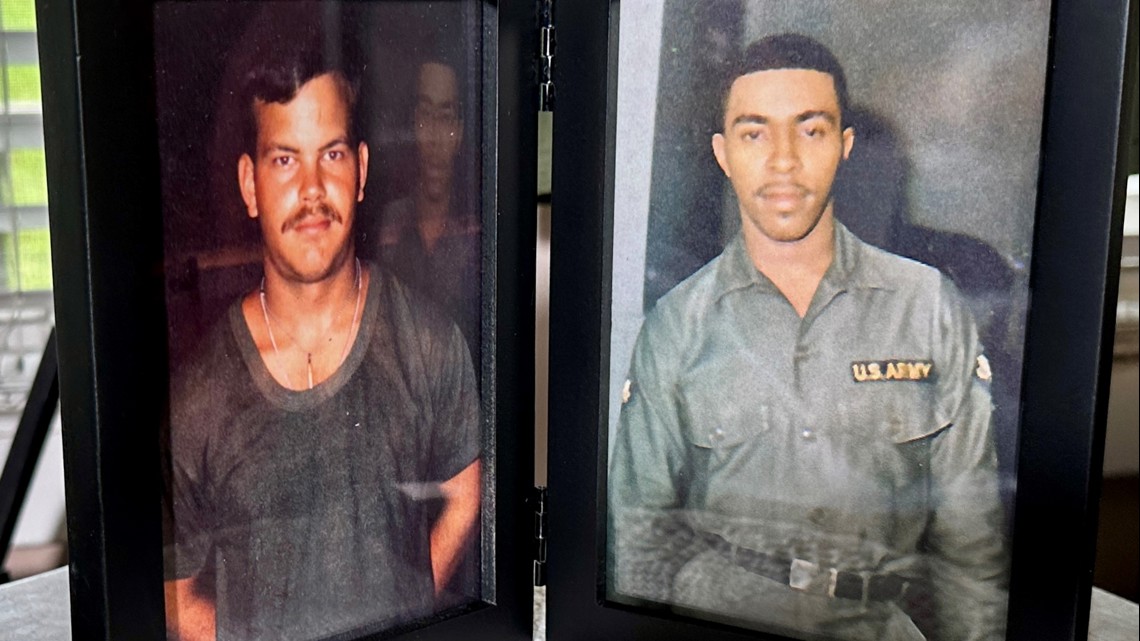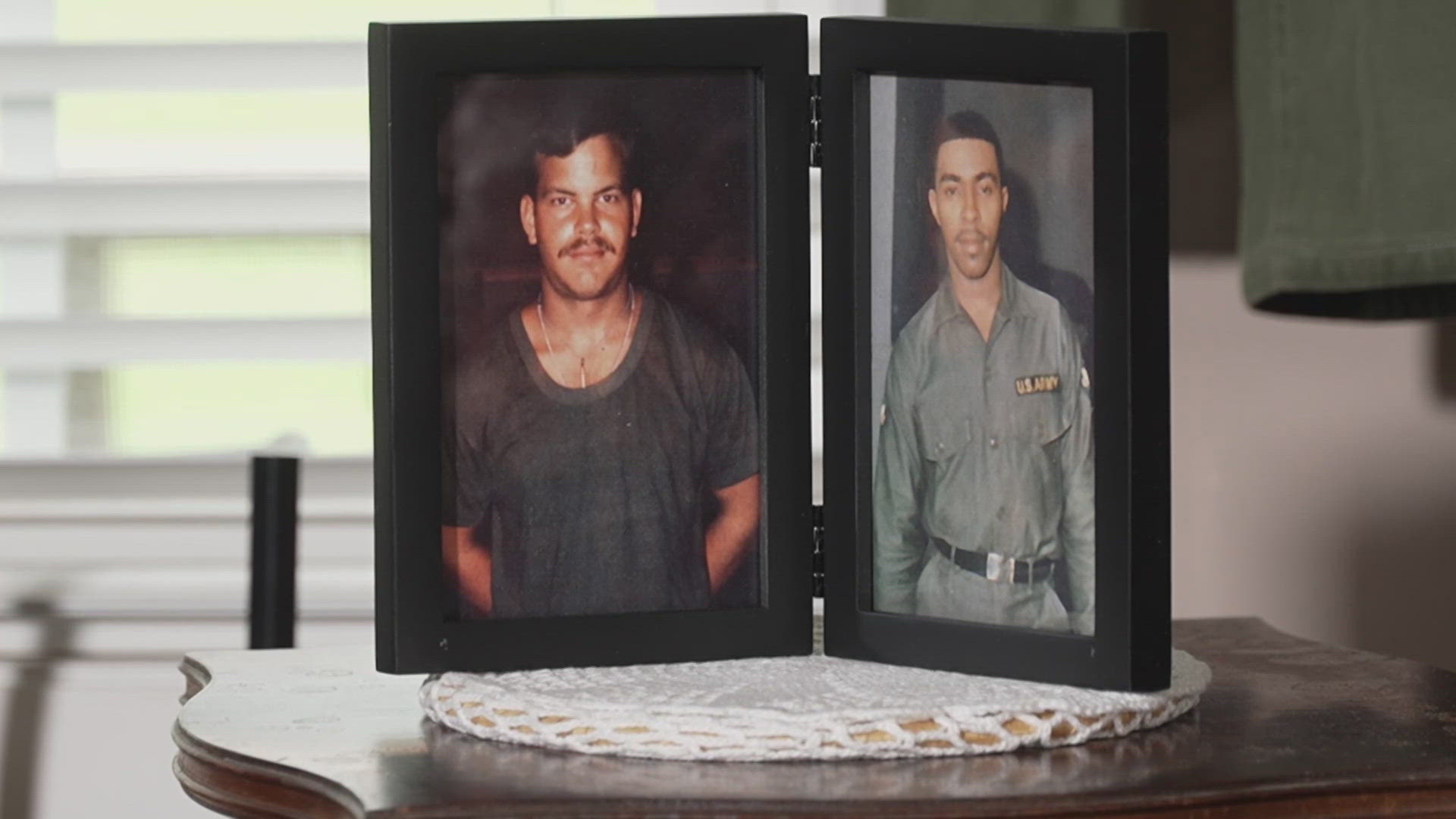KNOXVILLE, Tenn. — A Black man from the south. A white man from the north. Together they are marking five decades of friendship.
“I consider him an older brother,” John Winsauer said about his longtime friend Dell Ray Adams. "A real friend is true. They tell you what it is whether it’s good or bad."


The two men, now in their mid-seventies, met on the job back in 1976 and within a day newcomer John was at the breakfast table with members of the Adams family.
"...His mom's house for Saturday morning breakfast. And she walked in, and she was a wonderful, warm, beautiful mom. And she gives me the big hug and just a southern welcome,” Winsauer said.
Their friendship deepened after learning about the combat trials both endured in a shared war, Vietnam.
“I'm the service. He's the sacrifice. I mean, he was wounded in battle,” Winsauer said, who would encourage his friend to go to college. Adams found it a valuable lesson and in turn, shared bits of his own wisdom with his friend.
“I said, 'John if you can’t change it, change your attitude about it,'” Adams said, who adds lesson one in life is, "Be true to yourself."
“…That became a mantra for me. Listen, better, talk less and listen more,” Winsauer said, reflecting on another nugget of advice from his friend of almost five decades.
Brothers not in blood but in spirit, in uniform, and in a shared curiosity and respect for strangers who may one day become a lifelong friend.
“It’s part of our culture that's kind of sliding away with the technology…. on the phone and those things, but people have spectacular stories, and I just encourage everyone to listen to them, and the reward will be yours as well as theirs,” Winsauer said.
They answered 10 questions about their military service. Those questions and their answers are available below.
Dell Ray Adams
1. What one person influenced you most in life?
My Mother, Hazel Adams.
2. Do you feel honored and respected for serving your country?
Yes.
3. How can people thank you for your service?
Acknowledge and support.
4. How can you honor and support your fellow servicemen and women?
Respecting their service and insisting that the VA help those Veterans with special needs.
5. How do you think this generation of military men and women is different or similar to yours?
Similar, yet very different; in my day the draft was front and center. Volunteers for the military often have a different view and perspective of military service.
6. What influence did your military service have on the rest of your life?
Military service in my era changed my life significantly. The Viet Nam War was very controversial; people had very different views about the war. I saw people live and die in the war and I couldn’t understand why, and I still can’t.
7. Does your family have a history of military service?
Yes, my uncle did two terms in Viet Nam; one of my brothers was in the Army. I had uncles and a grandfather in the Korean War and WWII.
8. Would you encourage younger generations in your family to join the service?
Today, young people have many options, military service is one. One of my best friend’s sons joined the military after finishing college. Follow your dreams.
9. How has your opinion of war changed?
I am against War.
10. How did your military experience shape your religious faith?
It didn’t.
John Winsauer
1. What one person influenced you most in life?
My wife Anne Mason. We both had different upbringings: Anne with a conservative Tennessee Southern Baptist background, the second of two with an older brother. I was from a liberal Wisconsin Catholic family, 4th of 9 children. With love, through uncertainty and strife, we grew into loving partners and parents, respecting our differences and able to maintain our individuality for 46 years.
2. Do you feel honored and respected for serving your country?
Now I do, but in the fall of 1970 upon returning to a country in social upheaval I didn’t. The vocal American society was judging our service as that of murders and rapists and said so: the silent majority was, well, silent. It was a difficult time.
3. How can people thank you for your service?
Honoring the servicemen of the current generations and not judging that of which you have no experience. Combat is a lonely physical and psychological experience.
4. How can you honor and support your fellow servicemen and women?
Firstly, by listening to what they have to say. Secondly, by recognizing their needs, whether friendship or first rate medical and social recovery assistance.
5. How do you think this generation of military men and women is different or similar to yours?
I was drafted into the Army because I could not afford to go to college full time. Now we have an all-volunteer military system which ended that type of institutionalized discrimination.
6. What influence did the military have on the rest of your life?
Mostly confidence, but also self-control, organized thinking, and understanding that a job wasn’t over until it was finished completely.
7. Does your family have a history of military service?
My grandfather fought in the Argon Forest with the American Expeditionary Forces in 1918 and my dad as a E7 medic with Patton’s 3rd Armor Division (Spearhead) from North Africa to the Battle of the Bulge and into Dora-Mittelbau concentration camp in April 1945.
8. Would you encourage younger generations in your family to join the service?
It would depend on the individual and their grasp of the current anti-diversity segments of our society.
9. How has your opinion of war changed?
I now believe that offensive warfare is reprehensible and a defensive response is mandatory.
10. How did your military experience shape your religious faith?
The GI Bill enabled me to go to undergraduate and graduate school. There I concluded I am a creature whose purpose is to accept the love of my creator and exemplify that favor to others such that when I reach out to assist another it is the hand of the creator.

